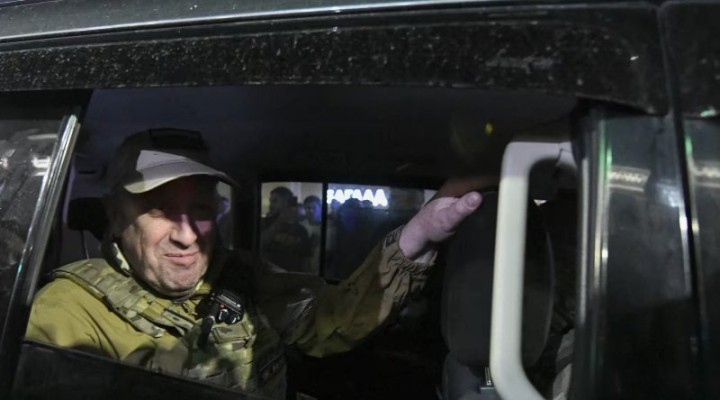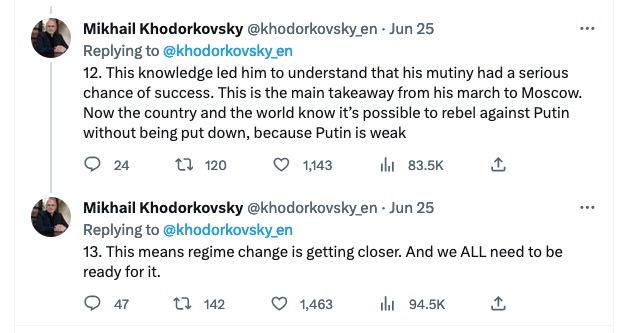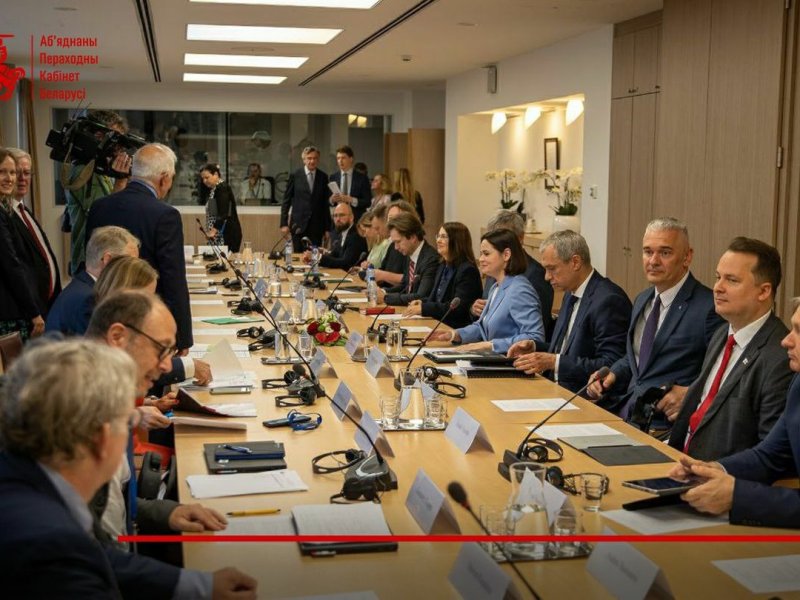The Russian and Western secret services facing the rebellion of Yevgeny Prigozhin

By rebelling in the middle of the war to keep in his own name the property entrusted to him, Yevgeny Prigozhin threatened the cohesion of his country. This case, which could have been dramatic, nevertheless ended well. Independently of this initiative, the Western and Russian secret services had foreseen in advance, one and the other, the advantages which they could draw from it.
The Russian and Western secret services [ 1 ] observed the degradation of relations between Yevgeny Prigozhin and Sergei Shoigu, the Russian Minister of Defence. Of course, they interpreted it differently and therefore drew different predictions.
For Western services, this conflict was encouraged by the master of the Kremlin. It was a way for him to push both sides to give their best. However, the rivalry between the men would grow and ultimately divide the Russian forces instead of strengthening them. It would then be necessary to take advantage of Moscow’s weakness to launch the country’s dismantling program, developed in July 2022, relying on various minorities [ 2 ] . This is the meaning of the presentation that the CIA made to US parliamentarians a few days before the rebellion of Yevgeny Prigozhin.
For the Russian services, which refrained from interfering in the way President Putin managed this rivalry, the conflict was inevitably going to grow. At one point, the officers and senior civil servants opposed to the regime were going to position themselves not for one camp against the other, but for a possible change of system. They should be identified immediately and prepared to purge them from the state apparatus.
Of course, no one thought Yevgeny Prigozhin would act the way he chose, or when he would act. Also when he headed for the headquarters in Rostov-on-Don (02.30 a.m.), no one yet knew if this was part of the one-upmanship between Wagner and the Ministry of Defense or if something new was happening. It was not until the night, when he mastered Rostov-on-Don (07:30) and started his march on Moscow that everyone understood that the time to act had come [ 3 ] .
The CIA, the MI6 and the Mossad then awakened their contacts both in Russia and in the other states of the former USSR still allied with Moscow; first and foremost in Belarus, Kazakhstan and Uzbekistan, three states where Westerners have failed over the past two years to organize “colored revolutions”.
Ukrainian leaders have asked the thousand Belarusians who fight under their flag in the Kastous-Kalinowski Battalion to call on their families to overthrow President Alexander Lukashenko. Identical appeals were made against Kazakh Presidents Kassym-Jomart Tokayev and Uzbek Presidents Shavkat Mirziyoyev. Western contacts in Chechnya do not seem to have answered the call.
President Vladimir Putin, after his address to the nation (10 a.m.), telephoned his Belarusian, Kazakh and Uzbek counterparts (1:30 p.m.). To each he reminded them that they had endured a Western-fueled uprising and recovered from it. He told them that Russia would not waver and urged them to be vigilant at home.
The Russian opposition in exile (that is, the one supported by the West) has called for regime change in Moscow. Ex-oligarch Mikhail Khodorkovsky, who was arrested for tax evasion in 2003 when he launched a putsch [ 4 ] , tweeted that the Prigozhin rebellion proved that it was possible to overthrow Vladimir Putin and that everyone should do so. prepare for this eventuality. Chess champion Garry Kasparov, a former supporter of Boris Yeltsin, did the same. He thought his revenge was possible. Lawyer Alexeï Navalny let it be known from his Siberian prison that he supported the movement.

These three men are the main cards for Westerners in Russia. Contrary to what many international media claim, they are not at all popular in their country, any more than pro-US Libyan or Syrian opposition leaders were during the military operations against their countries.
All three denounce Russia’s intervention in Ukraine as imperialist interference. They call for a cessation of hostilities and a judgment of the Russian leadership by an international criminal tribunal. At the beginning of the Russian special military operation, they founded the Russian Action Committee in Lithuania, but found no echo in their country.
To everyone’s surprise, the rebellion ended in the evening (8:00 p.m.) without anyone knowing what agreement had been signed by Progojine. It only lasted 18 hours; a period far too short for the Western and Russian secret services to achieve their respective objectives.

The fact remains that the Western Belarusian agents have been awakened. Sviatlana Tsikhanouskaya, a former presidential candidate exiled in Lithuania, formed the government in exile she had envisioned as early as February 24, 2022 (the start of the Russian special operation). It was received by the European authorities who, however, were careful not to recognize this puppet government.
Ukrainian intelligence also announced that Progozhin was on the Russian FSB’s kill list. It is obviously an intoxication, Vladimir Putin having promised not to punish him. The Moscow Times (pro-US), meanwhile, assured that General Sergei Surovikin had been arrested for complicity with the rebels. He was in fact questioned at length by the FSB as he had been an honorary member of Wagner since his service in Syria.
Translated by TheAltWorld
[ 1 ] “ US gathered detailed intelligence on Wagner chief’s rebellion plans but kept it secret from most allies ”, Natasha Bertrand, Alex Marquardt, Kylie Atwood & Kevin Liptak, CNN, June 27, 2023.
[ 2 ] “ The Western strategy to dismantle the Russian Federation ”, by Thierry Meyssan, Voltaire Network , August 16, 2022.
[ 3 ] “ The rebellion of Evgueni Prigojine ”, by Thierry Meyssan, Voltaire Network, June 27, 2023.
[ 4 ] “ Bush, Khodorkovsky & Associates ”, Voltaire Network , November 13, 2003.
 TheAltWorld
TheAltWorld 
0 thoughts on “The Russian and Western secret services facing the rebellion of Yevgeny Prigozhin”